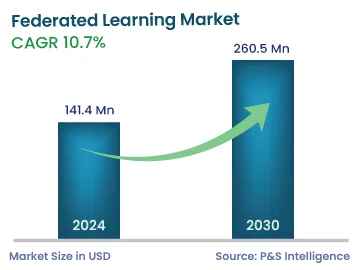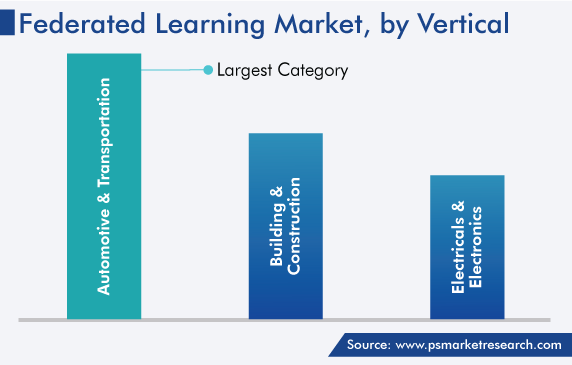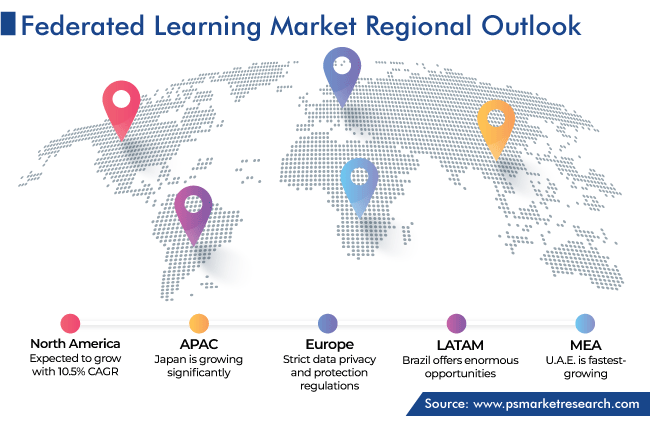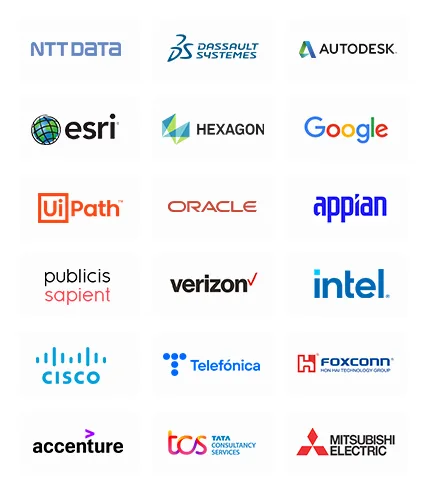Market Statistics
| Study Period | 2019 - 2030 |
| 2024 Market Size | 141.4 Million |
| 2030 Forecast | 260.5 Million |
| Growth Rate(CAGR) | 10.7% |
| Largest Region | Europe |
| Fastest Growing Region | North America |
| Nature of the Market | Consolidated |
Report Code: 12771
Get a Comprehensive Overview of the Federated Learning Market Report Prepared by P&S Intelligence, Segmented by Application (Drug Discovery, Shopping Experience Personalization, Data Privacy & Security Management, Risk Management, Industrial IoT, Online Visual Object Detection, Augmented Reality/Virtual Reality), Vertical (Building & Construction, Automotive & Transportation, Electricals & Electronics, Healthcare, Industrial Assembly, Woodworking), and Geographic Regions. This Report Provides Insights From 2019 to 2030.
| Study Period | 2019 - 2030 |
| 2024 Market Size | 141.4 Million |
| 2030 Forecast | 260.5 Million |
| Growth Rate(CAGR) | 10.7% |
| Largest Region | Europe |
| Fastest Growing Region | North America |
| Nature of the Market | Consolidated |

Explore the market potential with our data-driven report
The global federated learning market revenue was valued at USD 141.4 million in 2024, which is expected to reach USD 260.5 million by 2030, growing at a CAGR of 10.7% during 2024-2030. This is ascribed to the surging adoption of this learning solution in various industries to enhance knowledge about devices and organizations.
Moreover, its advantageous features, such as data privacy, over traditional learning, make it unique. It permits a number of players to develop robust deep training models without actual data sharing from devices, thus maintaining data protection, confidentiality, privileged access to information, and accessibility to grand data sets to be worked on.
Federated learning (FL) is a major revolutionary advancement in the area of artificial intelligence and data science. It has the potential to outpace the limits of centralized machine learning. Prominent MNCs like Google, Facebook, and Microsoft are using this learning technique to increase the potential of data experts.
It is an ML technique that can be termed collective learning, which permits a cluster of decentralized edge systems in order to train ML models without the need to store or move new information to a central server. Training in FL applications utilizes a periodic process that is done a number of times on multiple servers or devices.
Its working is quite simple and easy to start. A central server develops a base model for sending it to edge machine learning operation (MLOp) devices. Each device obtains a non-trained or pre-trained machine learning model for further training with local data. The systems do not share their information with the central server or with each other. Only biases, suggestions, and preferences data go to the server, which then sums the local models to develop a collective model.
Further, the model updates are analyzed to find out the exactness and recognize any enhancements over the last version. The shared model method is used repeatedly until the process attains an acceptable level of precision or until a set number of repetitions has been touched. For instance, in previous years, Google scientists have been using this process to advance prediction processes in their Google board on Android devices. Apple is also using federated learning in order to improve its Siri Voice Assistant, personalize the maps application, and improve customer experience by giving enhanced privacy.
Additionally, there are various advantages of using federated learning over classical machine learning. It provides increased scalability and cost-efficiency by storing datasets in multiple locations and training models on each device parallelly. It fastens the AI and IoT deployment models and improves the scalability of the processes. It also offers higher adaptability and enhanced data accuracy and diversity by exposing models to a large extent of data, which can improve the model’s capability to generalize fresh data, handle differences, and lessen bias.
The advent of FL is transforming the way machine learning techniques operate. Companies are focusing to the fullest on studying FL, owing to its potential to reinforce algorithms and innovate AI applications. Thus, the demand for FL solutions is rising in various corporations.
Federated learning can help healthcare professionals reach high-quality outcomes and advance medication development. It allows many healthcare institutions to come together and train models by utilizing decentralized data. Many hospitals, clinics, and research institutions can combine their data while ensuring data privacy. This leads to stronger and more generalizable models. It also helps researchers by giving them access to a broader and more diverse range of data for their studies, which ultimately leads to enhanced medical research and discovery. Also, personalized healthcare models can be developed by using patient-specific data, which provides tailored treatment plans and disease risk assessments, leading to the market growth.
Moreover, FL is catching pace in the BFSI sector, as data security and privacy are of paramount importance. It permits collaborative model training without actually sharing sensitive customer data, lowering the risk of data breaches and unauthorized access. This sector maintains strict regulations by implementing laws such as the General Data Protection Regulation (GDPR). This learning helps in complying with these regulations, as data privacy is its unique feature. Further, it aids in deriving valuable insights by gathering data from various sources such as multiple banks and insurance companies. The main services it provides, which are prime in BFSI, include fraud detection and risk assessment. It is done by analyzing data from different sources, patterns, and anomalies.
Additionally, its usage is increasing in the e-commerce sector, to create models on customer personalized experience. These models help in finding clients’ likelihood to purchase a product, customer preferences, and customer churn rate. It is done by collecting specific data, such as how much time a client spends on a manufacturer’s website, what are items being bought simultaneously, items viewed but not bought, as well as other customer information. During a time duration, every client has around 50–1,000 data points, which are analyzed in order to extract usable information.
The industrial IoT category in the application segment held a revenue share of 20%, in the federated learning market, in 2023. This is due to the advantages, such as increased productivity, lowered costs, and easy addition of new business models, offered by federated learning in combination with IoT; the surging technological advancements in developing and developed countries; and the increasing utilization of big data analytics.
Moreover, Industry 4.0 has been possible by integrating IoT and AI, creating enormous opportunities for manufacturing companies in the way they operate. This learning has transformed automation as never seen before by creating a smart network from multiple devices, sensors, actuators, and machines, facilitating the easy flow of data. It can also reduce the gap between cyber-physical systems in the manufacturing and information technology sectors.
Further, industrial IoT produces large amounts of data, which is not possible for humans to consume and analyze efficiently and effectively. AI and ML have the potential to reveal the value of IoT data by integrating a sheet of intelligence and analyzing these large datasets in a number of applications and developing insights for decision-makers permitting them to go for the best course of action.
The automotive and transportation category held the largest revenue share, of 35%, in 2023. This is due to the surging sales of automobiles all over the world, as economies are rising and the population is increasing. This leads to more and more traffic on roads and ultimately congestion, and people spend hours beating traffic. This drives the need for federated learning, which with the help of AI & ML algorithms, can help in handling traffic by optimizing routes and innovative solutions for cars. This also improves vehicle automation.
Moreover, by making proper use of FL, automobile manufacturers can develop future-oriented cars, which aid in sustainable development. Also, autonomous vehicles use less energy, emit less emissions, and lower the chances of road accidents. In addition, artificial intelligence-powered design paired with 3D printing techniques can be used to manufacture various automobile parts that are economical and lightweight. Effective learning selects the most useful pieces of data to analyze and send that data into an instructional pool. Thus, these factors are projected to boost the market growth in this vertical.

Drive strategic growth with comprehensive market analysis
Globally, the European federated learning market accounted for the largest revenue share, of 50%, in 2023, and it is also expected to witness the same trend in the coming years. This is ascribed to the strict privacy and protection regulations implemented by governments under the General Data Protection Regulation. Data privacy is a paramount feature of federated learning, which aligns with these regulations, thus making FL a luring approach for organizations within the region.
Moreover, Europe has made collaborations and standardization efforts with industry stakeholders, academic institutions, and government bodies. Programs like the European AI Alliance and the European Union’s Horizon encourage cooperation, knowledge sharing, and the development of common standards, which, in turn, lead to better data creation and analysis. This leads to the generation of advanced models and accelerates the use and deployment of federated learning. Also, Europe has a strong R&D ecosystem with prominent universities, research institutions, and technology companies investing great amounts in cutting-edge technologies. These all help the region to stay at the forefront of emerging technologies such as FL.

Furthermore, Europe has a world-renowned automotive market, owing to the existence of premium car makers such as BMW, Audi, and Volkswagen AG. This is also boosting the demand for FL, as it is very useful in automotive and transportation systems. In addition, the region has been focusing on the importance of ethical and responsible learning practices. Thus, companies and organizations that give more attention to ethical learning techniques are more inclined to adopt FL solutions.
This report offers deep insights into the federated learning industry, with size estimation for 2019 to 2030, the major drivers, restraints, trends and opportunities, and competitor analysis.
Based on Application
Based on Vertical
Geographical Analysis
The federated learning market size stood at USD 141.4 million in 2024.
During 2024–2030, the growth rate of the federated learning market will be around 10.7%.
Automotive and transportation is the largest vertical in the federated learning market.
The major drivers of the federated learning market include the rapid acceptance of federated learning across a variety of sectors to improve learning about devices and organizations and its benefits over traditional learning such as data privacy.
Want a report tailored exactly to your business need?
Request CustomizationLeading companies across industries trust us to deliver data-driven insights and innovative solutions for their most critical decisions. From data-driven strategies to actionable insights, we empower the decision-makers who shape industries and define the future. From Fortune 500 companies to innovative startups, we are proud to partner with organisations that drive progress in their industries.


Working with P&S Intelligence and their team was an absolute pleasure – their awareness of timelines and commitment to value greatly contributed to our project's success. Eagerly anticipating future collaborations.
McKinsey & Company
IndiaOur insights into the minutest levels of the markets, including the latest trends and competitive landscape, give you all the answers you need to take your business to new heights
We take a cautious approach to protecting your personal and confidential information. Trust is the strongest bond that connects us and our clients, and trust we build by complying with all international and domestic data protection and privacy laws
Customize the Report to Align with Your Business Objectives
Request the Free Sample Pages